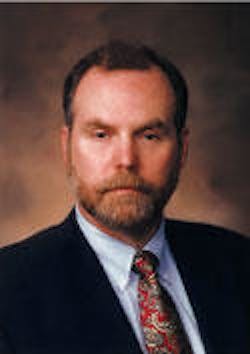FCC chairman's subtle telecom bias
BY STEPHEN N. BROWN
On the subject of FTTH, Powell's loose lips could be sinking fiber's ship.
Several months ago, FCC chairman Michael Powell made an offhand remark about fiber-to-the-home (FTTH) infrastructure. The remark, when placed in the larger context of telecom policy and the chairman's actions, shows that he has a nearly hidden but strongly negative attitude toward FTTH. Musing on the state of telecommunications, Powell said in the Forrester Research Telecom Forum, "We're not really laying from scratch. . . an entirely new wired infrastructure, except in aspects of the long-haul, which I think are already coming along nicely." But he saw no need for the luxury of new infrastructure in local networks: "We're going to build this stuff on top of phone lines that already reach 95% of Americans. We're going to build this stuff on top of coaxial cable that reach 96-98% of homes in America already. . . And I'll sort of leave out whether fiber-optic will one day be the thing that we do have kind of a [rural] electrification project about."
"Leave out" fiber optics is the operative phrase. Powell thinks only of preserving the incumbents' infrastructure, despite his recent emphasis that the incumbents' competitors build their own facilities instead of using the incumbents' local loops. Even when the fiber industry moves to protect its self-interest, he makes a "read between the lines" criticism: In the past year, the fiber business has lobbied loudly for an investment tax credit applied to fiber investments, and the FTTH Council publicly urged the Bush Administration to adopt that policy in any economic stimulus package. But last October, Powell spoke at the National Summit on Broadband Deployment and warned, "Be cautious not to embed inferior technology. Government is a notoriously bad investor. . . the market is the best vehicle designed by mankind for innovation, for technology change and evolution." Although he did not mention the tax credit and the fiber industry, he did not have to because no other industry has lobbied so visibly and so long for the tax credit, which is the only form of "government investment" being considered to stimulate the telecom sector.
Powell also associates fiber optics with extravagance despite its long-term durability and superior performance in comparison to legacy networks. In an interview with ABC reporter Sam Donaldson, the chairman commented on the government's practice of auctioning off spectrum to the highest bidder: "[The] problem is a consequence of looking to these things as a way of increasing [government] revenue, not because they're the smart communication policy. [T]o give you another example, Europe is going to crush itself over what it paid for third-generation wireless spectrum. . .it paid too much. . .British Telecom is sitting on $35 billion of debt with no service and no customers. . .Somebody pointed out to me how dramatic that was. For the same amount of money, you could have wired every home in England with fiber-optic cable. So when the money, when the billions, becomes the stars in your eyes of communication policy, that can be a big mistake. One that I. . . hope. . .we avoid."
A first-year psychology major would notice the stream of negative mental associations that Powell has made: fiber optics > billions > star in your eyes > big mistake > avoid > inferior > leave out. The chairman's fear of FTTH is a good reason why the industry should lobby Congress directly about a new national telecom infrastructure, rather than lobbying the agency. Also, if Powell were such a strong believer in free markets, he should not care if the private sector bids up the price of spectrum so that FTTH becomes an economic alternative to embedded infrastructure.
Powell's desire to hold down the private sector's payments for spectrum should be explored by Congress because of his role in the NextWave deal. Five years ago, the company bid $5 billion for "C-Block" spectrum licenses to offer "third generation" wireless services but delivered only $500 million to the government, declared bankruptcy, lost, then regained the licenses. Powell brokered a deal in which Verizon, AT&T Wireless, and Cingular were to pay $5 billion to NextWave for its licenses and $10 billion to the government. In December, the House Energy and Commerce Committee, headed by Powell's close ally, Rep. Billy Tauzin (R-LA), initiated legislation to accommodate the settlement.
Sen. Ernest Hollings (D-SC) opposed the legislation, saying in a letter to congressional colleagues, "[W]e are being asked to legislate a scam. . .to reward. . . speculators who put. . .down $500 million. . .and are now on the cusp of a $5-billion payment. Rather than attempt to settle. . .the FCC should vigorously pursue its appeal. . .If we are to consider legislation, why not emphatically clarify that bankruptcy claims do not prevail over the FCC's role as the trustee of our airwaves? Enactment of such a bill would give the government more than [the] $15 billion that was bid in last year's re-auction. . .the FCC has never met or approved anything. . .the. . .chairman, acting on his own, engineered this deal."
Did Powell counsel the private sector to restrain its bids for spectrum and its offer to the government in the NextWave deal? It is legitimate to ask because of his public statement that European companies "paid too much" for spectrum and that he hoped American companies would not. But shouldn't Congress want to know if the FCC chairman fulfilled his fiduciary duty, putting the interests of the U.S. Treasury ahead of the companies he regulates?
Powell's policies and public remarks indicate the incumbents' great influence on him, to the point he is unable or unwilling to see the public interest as separate and distinct from their interests. At his urging, the FCC has removed limits on the amount of spectrum any one company controls, a move industry analysts say will spark mergers between wired and wireless companies that will blanket the country with slow-speed, monopoly-priced services, another unfortunate side effect of Powell's telecom bias against FTTH.Stephen N. Brown writes on public policy in telecommunications. He can be contacted by e-mail at [email protected] or telephone: (615) 399-1239.

